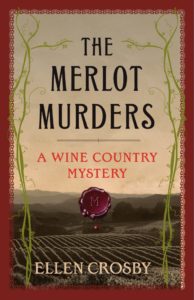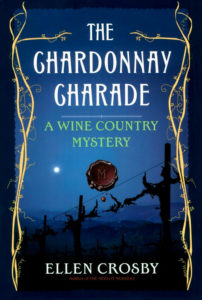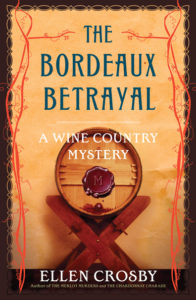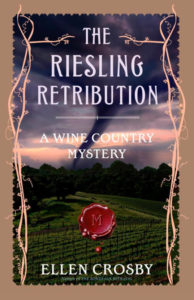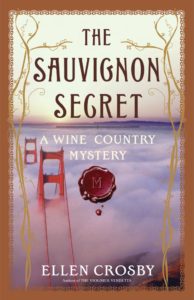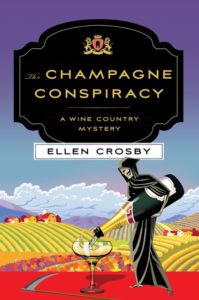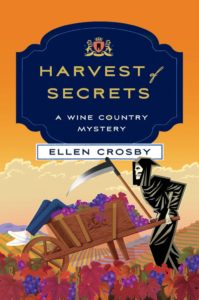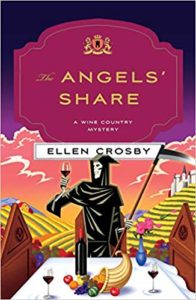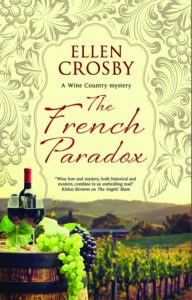The Viognier Vendetta
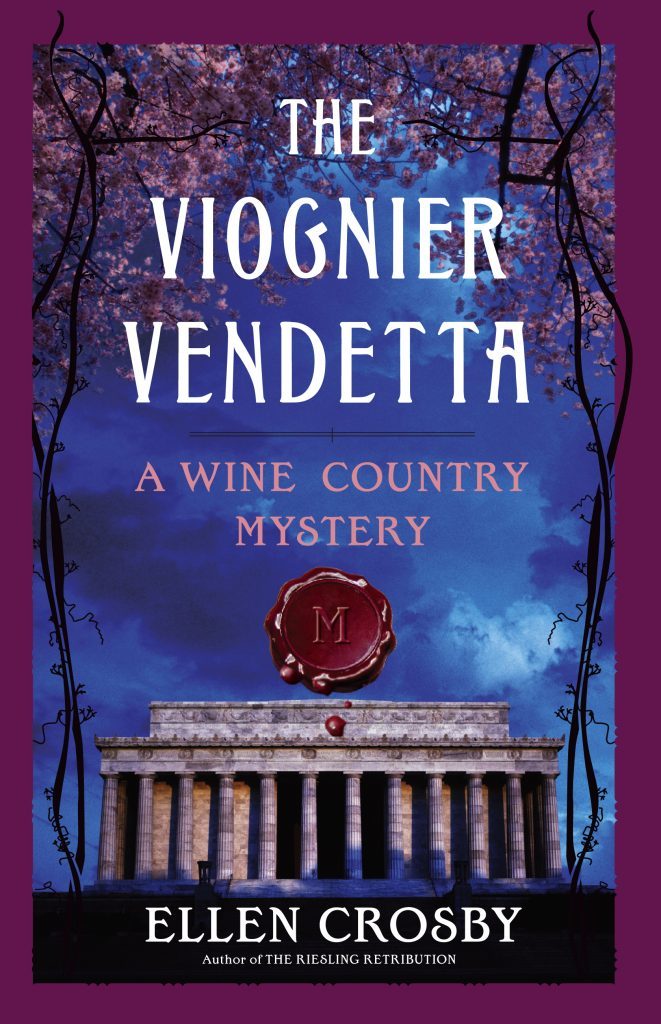 Buy the Book:
Buy the Book:Amazon
Barnes & Noble
IndieBound
Books-A-Million
Simon & Schuster
iBooks
Kobo
Google Play
Published by: Scribner
Release Date: August 12, 2017
Pages: 272
ISBN13: 9781439163870
Synopsis
When Lucie Montgomery visits Washington, D.C. during cherry blossom season she doesn't expect that her reunion with old friend Rebecca Natale is a setup. But Rebecca disappears into thin air after running an errand for her boss, billionaire philanthropist and investment guru Sir Thomas Asher. Also missing: an antique silver wine cooler looted by British soldiers before they burned the White House during the War of 1812.
The next morning Lucie identifies Rebecca's neatly folded clothes found in a rowboat floating in the Potomac River. Is it suicide, murder, or an elaborate scheme to disappear? A clandestine meeting in the U.S. Capitol, a startling revelation on a windy hill, and cryptic messages from Rebecca cloaked in eighteenth-century poetry are all part of the tantalizing mystery of whether Rebecca is alive or dead.
(Note: The Vintage Vendetta was originally published by Scribner under the title The Viognier Vendetta)
Praise
"The Viognier Vendetta proves to be a fine vintage."
—Oline Cogdill, The Sun-Sentinel
"The meticulously researched historical background -- always a hallmark in Crosby's novels -- is nicely balanced by an intriguing mystery."
—Booklist
"Crosby's deft hand at plotmaking, memorable characters and seamless prose are again in evidence in The Viognier Vendetta, a book to savor -- and suitable for gulping."
—The Richmond Times-Dispatch
"A thoroughly delicious read."
—RT Book Reviews
"An addictive whodunit."
—Publishers Weekly
"Another pleasing combination of mystery, history and romance in a series that never disappoints."
—Kirkus Reviews
Excerpt
If you wish to keep your affairs secret, drink no wine.
—Author Unknown
When they ask me to become president of the United States, I’m going to say, “Except for Washington, D.C.”
—Bernard Samson, character in SPY HOOK by Len Deighton
Chapter 1
Ernest Hemingway once said you should always do sober what you said you’d do drunk because it would teach you to keep your mouth shut. It’s the kind of advice you remember the morning after when it’s too late and you’ve already given your word. Sometimes it’s a big deal, like the Madeira-fueled discussion between Thomas Jefferson and Alexander Hamilton back in 1790 over where to put the capital city of their new country. Sometimes it’s not—my promise after a few glasses of Viognier from my own vineyard to get together with an old college friend in that same city. What I didn’t know at the time was that my decision meet Rebecca Natale would be as life-changing for me as the wine-soaked agreement to carve Washington D.C. out of Maryland and Virginia was for the country.
The 212 area code popped up on my phone’s display as I finished another glass of wine in front of a dying fire one late March evening. My kid sister, the family gypsy, lived in Manhattan, flitting from a lover’s apartment to some friend’s couch. I never knew whose phone she’d borrow to call. But this time it wasn’t Mia on the other end of the line. It was Rebecca. The last time I’d heard from her was twelve years ago when she left school and her old life behind.
All she said was, “Hi, Lucie, it’s me.”
Something broke apart inside me and I remember thinking, “Why now?”
Instead I said, “So it is. Long time no see.”
“I know. That’s why I’m calling. I’ll be in Washington the first weekend in April,” she said. “If you’re free, I was wondering if you’d spend the weekend in town with me.”
Just like that. Not a word about all those years that passed with no phone call, no e-mail, no nothing.
“You’re coming to see the cherry blossoms?” I asked.
If she could be blasé about our little lacuna, so could I.
“Oh, gosh, I thought you’d realize why I’ll be there.” Her laughter sounded like broken glass. Maybe she wasn’t so blasé. “I work for Tommy Asher now. Haven’t you seen the stories? Vanity Fair? Vogue? You know about the Asher Collection being donated to the Library of Congress, don’t you?”
I’d seen both articles—the fashion shoot in Vogue and the VF piece, “The Rise and Rise of Wall Street’s New Whiz Kids.” Rebecca had become the glamorous protégé of billionaire investor guru Sir Thomas Asher. As for the Library donation, you’d have to be living in a cave for the past few months not to know that he and Lady Asher were making one of the most significant gifts to the Library of Congress since Thomas Jefferson sold his personal library to replace what the British burned in the War of 1812.
My curiosity outweighed my dulled anger and wine washed away some of the old hurt, so I said I’d meet her. I even agreed to be her guest Saturday evening at a black-tie gala honoring her boss’s philanthropy and patronage of the arts. When she told me it was rumored the president would attend, I nearly asked “president of what?” until I realized whom she meant.
The next morning I thought about calling back and explaining that something had come up.
But I didn’t.
Rebecca had booked a suite for us at the Willard, two blocks from the White House. For anyone who knows Washington, it’s iconic, a place of Old World elegance and luxury with its lobby of elaborate mosaic floors, coffered ceilings, marbled columns, and Federal-style furniture grouped in discreet seating areas throughout the room.
It has a nickname as “the residence of presidents” because every U.S. president since the hotel opened in 1850 has either visited or stayed there. Other luminaries on their guest list include Mark Twain, Houdini, Walt Whitman, Jenny Lind, and Mae West. Julia Ward Howe wrote “The Battle Hymn of the Republic” while staying there. Martin Luther King, Jr. wrote his “I Have a Dream” speech at the Willard.
A hotel doorman held the door as I walked into the splendid lobby past an enormous vase of hyacinths that graced a table of inlaid wood and mother-of-pearl. The old-fashioned clock above the mahogany and marble front desk said quarter to one. I gave my name to the clerk behind the desk and pulled out my credit card. He waved it away.
“It’s taken care of.” He reached for something from a bank of pigeonhole mailboxes that ran the length of the desk behind him. An envelope. He handed it to me along with the small folder containing my room keycard.
“Ms. Natale asked me to give you this when you arrived, Ms. Montgomery,” he said. “Welcome to the Willard.”
I slid my finger under the heavy vellum flap and pulled out a sheet of paper embossed with the hotel’s logo.
In a meeting with Tommy and Mandy all morning. Will be finished by 1. Meet me at the bottom of the steps to the Lincoln Memorial. ---R.
I slipped some money to the bellhop who whisked away my overnight case and garment bag and gave a few more dollars to the valet who put me in a taxi a minute later. The cab zipped down 14th Street to Constitution Avenue, past tourist buses lined up by the Washington Monument and the west lawn of the White House. Across the scrubby expanse of the mall, a ring of American flags surrounding the gray needle-like monument snapped in the wind.
At home in Atoka, Virginia, some fifty miles west, the landscape was still painted in winter colors of straw and washed-out yellow-green. The Blue Ridge Mountains, which for most of the year lived up to their name, were drab and dun-colored. Here, though, the promise of spring already hung in the air. On my drive into town white dogwood bloomed along the roadside and the banks of Rock Creek Parkway were massed with daffodils and clumps of crocus. Here at the Washington Monument pink and white buds covered the cherry trees like a lace curtain.
The cab dropped me on the Ohio Drive side of the Lincoln Memorial where more blooming trees graced the embankment by the Potomac River. I waited for the light on Independence and wondered why Rebecca had decided we should meet here, rather than the hotel.
I understood as soon as I saw her standing on the marble steps of the memorial, regarding me like a Greek goddess at the entrance to her temple, holding a bouquet of yellow roses. I’d nearly forgotten how her sloe-eyed dusky beauty, inherited from a Vietnamese mother and Italian father, turned men’s—and women’s—heads. Even now she earned appreciative stares from tourists who passed by.
She descended the stairs with the fluid grace I remembered from our days as running partners at school, but everything else about her had changed. Movie-star sunglasses held back her shoulder-length dark hair to reveal large teardrop diamond earrings. Around her neck hung a matching pendant. Somehow I knew the stones were real. She wore a well-cut persimmon wool blazer, cream silk blouse, and slim jeans that looked tailored. The fringe of an off-white silk shawl flung around her shoulders fluttered in the breeze. It didn’t look like she was buying her clothes in second-hand shops any more.
We hadn’t seen each other since my accident, so she’d never seen the cane I now used. When her eyes fell on it I caught the brief flicker of consternation and something else—I think it was shock. She recovered at once, though her laugh was too hearty, too forced, and her hug a little too fierce.
“Oh, my God! I can’t believe it! Look at you, Lucie, you look fabulous.”
I patted her back with one hand. This was going to be harder than I expected.
“I forgot to thank you for the flowers you sent me in the hospital.”
The nurses were sure the extravagant bouquet of white roses, Calla lilies, and hydrangea had been sent by my boyfriend who’d been driving the car that smashed into a stone wall with me in the passenger seat. I’d recognized Rebecca’s distinctive bold scrawl the moment I saw the card.
‘Who shall decide when doctors disagree, and soundest casuists doubt, like you and me?’ Don’t listen to the docs and don’t doubt yourself. Chin up—you’ll pull through. R.
So she’d heard that my doctors didn’t think I’d walk again. Later I looked up the quote. Alexander Pope—I should have guessed. Rebecca had a fine mathematical mind but she possessed a poet’s soul. She especially loved the Restoration poets for their interest in reason and logic and their desire to bring order to the natural world. As for the casuists, she shared their practical view of life: deciding right or wrong on moral issues depended on the circumstances. Deceiving someone or lying to them was wrong—unless the consequences were worse if you didn’t.
I wondered if she’d changed.
“You’re mad at me, aren’t you?” The exotic tilt to her eyes always made her look as though she’d just woken up to something that pleased her. Now a new shrewdness glittered in them.
At least we were going to get right to it.
“Yes,” I said.
“Why’d you come?”
“Curiosity. Why’d you ask me?”
The question surprised her. “It’s been too long. I wanted to see you.”
Sure she did. “What do you want, Rebecca?”
“Wow, you don’t let up, do you?” She brushed back a strand of hair the wind had whipped into her eyes and laughed uneasily. “I mean it. I wanted to see you. You stuck by me through tough times, Little. I haven’t forgotten.”
In my freshman year of college, the bewitching and brainy Rebecca Natale had been assigned as my “big sister” when I’d joined the cross-country team. Back then I called her “Big” since she was also a senior; she reciprocated with “Little.”
Running was the only thing the two of us had in common. Rebecca grew up in the hardscrabble Dorchester section of Boston, the daughter of immigrants. She worked a couple of jobs to pay for what loans and a scholarship didn’t cover and lived on vending machine food because it was cheap. I grew up in the affluent heart of Virginia horse and hunt country, a picturesque region of rolling hills, charming villages, and fence-lined country lanes. My tuition was paid from a trust fund set up by my grandparents.
What cemented our friendship was the scandal. Rebecca’s affair with a married professor whose wife also taught at the university. The sordid gossip that went around about motel trysts and sex on his office desk shocked everyone. I never asked her about it and she never discussed it—not one single time during the hours and hours we trained together.
I stared at her now.
“Are you in trouble?” I asked. “Is that what this is all about?”
I didn’t say “again” but I did think it.
Her voice was firm though I noticed she didn’t look me in the eye. “Of course I’m not in trouble. I’ve been doing some thinking and I know I didn’t do right by our friendship after I left school. I wanted to see you.” She hesitated. “To ask you to forgive me.”
I hadn’t seen that coming. Rebecca knew it, too, and she pushed on.
“The last thing I wanted to do was lay this on you thirty seconds after we see each other again.” She pointed to where Lincoln sat in his splendid chamber above us. “I’ve got to buy a couple of post cards. You mind waiting if I run up to the gift shop? Maybe we could rewind. Start this reunion over again.”
“I can climb stairs, Big.”
Now she was the one who was caught off guard. “That’s not what I meant—”
“Then don’t treat me like I’m not up to this, not strong enough mentally or physically.”
She could figure out for herself whether I was talking about stair-climbing or seeing each other again.
“God, Lucie, that’s the last thing I’d ever do. You’re stronger than anyone I know.” She laid a hand on my arm, this time her eyes searching mine. “I mean it.”
“Then let’s go.” I turned toward the stairs, uncomfortable with the sudden intimacy. “It’s been years since I visited this place.”
“Sure.” She withdrew her hand. “Lead the way.”
Halfway up the stairs she said, “I guess ‘how’ve you been’ is kind of a stupid question.”
I looked up at the enormous contemplative statue of Lincoln, which had gradually came into view.
“Why’d you wait so long to get in touch? Twelve years since you graduated, Big.”
“I know. I’m sorry. It’s just that I had a lot of things to figure out about myself and my life after everything with Connor . . .”
I waited, but she didn’t finish the sentence.
“You ever see him again?”
“Nope. I heard he left teaching all together. Moved to Wyoming and bought a ranch. His wife’s teaching at Georgetown now.” She added, “Ex-wife.”
I nodded. Somehow I knew there would be more if I waited. There was. She seemed to be struggling with her emotions.
“You never asked me about Connor, never said a word about what happened. Never judged me. I don’t know if you realized how much that meant to me. Everyone else said I ruined his marriage, broke up his beautiful family.”
“I had no right to judge you.” We reached the main chamber, clogged with tourists visiting for the cherry blossoms. “I had no idea what the circumstances were.”
“The circumstances were unbelievably frickin’ complicated! I never told anyone the truth! Everyone was so concerned about Connor. His life, his career, his wife and kids. No one gave a damn about me.” I didn’t expect the anger and bitterness after all these years. Somehow I thought she would have moved on, put it behind her.
She took a deep breath, steadying herself. “Whew, sorry. I still get worked up about it.”
“It’s okay.”
Her smile twisted. “Could you hold these flowers for a minute? Let me get my postcards and then we can go.”
“Get them where?”
“Gift shop.”
She indicated a small doorway tucked into one of the interior walls facing the mall. I took the roses and watched her disappear inside the limestone wall like Alice down the rabbit hole.
The translucent marble ceiling with its bronzed crossbeams and a few dim spotlights gave the light inside the cavernous chamber a viscous timeworn patina. Laughter and the chatter of tourists and visitors reverberated off the walls, an unintelligible din of white noise. I walked over and stood in front of Lincoln and read the words carved over his head.
In this temple, as in the heart of the people for whom he saved the Union, the memory of Abraham Lincoln is enshrined forever.
Staring into the distance, Lincoln looked somber with his clenched fists and slightly disheveled hair, as though he’d just come back from a walk and needed to put his thoughts in order. A group of teenagers in red sweatshirts stenciled with the logo of their Kansas high school band swarmed around me, voices shrill and excited. I moved away, shifting Rebecca’s roses in my arms. The card, attached with ribbon-covered florist’s wire, poked me. I turned it over and read the message.
For Richard Boyle, IV: Never find fault with the absent.
How funny. Hadn’t she just asked me to do the same for her? I wondered who Richard Boyle the fourth was and whether I was going to meet him.
“Okay, all set.”
She reappeared at my side holding an identical set of postcards of the memorial at night, glowing like a lit jewel.
“Did you know the Lincoln Memorial was modeled after the Temple of Zeus in Olympia?” she asked.
“Does it say that on the back of those postcards?”
She grinned. “No, I learned it from the Asher Collection. Where else? Tommy hired someone from the Metropolitan Museum of Art to set up displays in the lobby of our building in Manhattan. He’s incredibly proud of what he managed to put together. I think it was showing off, but every so often he used to invite historians to our staff meetings to talk about some arcane aspect of history or architecture. He never said any of us had to stick around to listen, but of course everybody did.”
“Broadening the knowledge base of his employees so they’re ready when they take over the global financial empire?”
Her smile broadened. “I guess we do have that reputation, don’t we?”
“Don’t tell me Sir Thomas doesn’t deliberately cultivate that aura of being discreet and exclusive. You don’t advertise or anything but everyone knows about you. Investing with Asher Investments is like joining a very privileged club.”
She shrugged. “Maybe, but Tommy’s pretty competitive when he goes after something he wants. He likes being first and best. Hence the Asher Collection. The most extensive collection in the world of drawings, maps, and correspondence—you name it—on anything to do with the design and construction of Washington, D.C. His special interest was the period where the city was rebuilt after the British burned it in 1814.”
“Interesting, considering he’s British,” I said.
Rebecca shot me an inscrutable look. “Tommy’s been a U.S. citizen for ages. Though it’s funny you mention it. For years it’s bugged him that an American rebuilt the Globe theatre in London. He thought it should have been a 100% British project. I think this is his way of trying to get even.”
“He sounds like eccentric.”
“He’s . . . well, he’s Tommy. You’ll meet him. Tonight is going to a mob scene with all the people coming to the gala, but I’ve put you on the guest list for the opening of the collection next week at the Library. There’s a dinner afterwards in one of the private rooms that’s never open to the public. It’s absolutely magnificent. You’ll have a great time, meet lots of interesting people.”
“Thanks,” I said, surprised. “I’d like that.”
“Good.” She tucked the postcards in her oversized Coach handbag. “Okay, next stop the Wall. You mind?”
The Wall. That explained the flowers. I gave them back to her. She meant the Vietnam Veterans Memorial just across the plaza, hidden by a scrim of shrubbery.
Vietnam belonged to our parents’ generation. Maybe Rebecca was paying tribute to a family friend, someone her mother, who’d grown up in Saigon during the war, or her father, who’d fought there, had known.
“No,” I said. “I don’t mind at all.”
Gusts of wind rippled the gray-blue reflecting pool, distorting the mirrored image of the Washington Monument and rustling the bare branches of the reddish-brown elms lining the paths like sentries. By the time we finished walking down the steps my perspective of the Mall had shifted to such an angle that the Capitol dome, perfectly aligned with the other monuments, was now visible on the horizon.
We crossed the plaza and went down a sloping path. The noise of the traffic on Constitution Avenue grew quieter, deadened by seventy black granite tablets stretching ahead of us—the legacy of a generation who still mourned lost brothers and husbands and lovers. Children who never knew their father.
“Who was Richard Boyle the fourth?” I asked. “I couldn’t help noticing your card.”
She glanced at me, then looked away. “My father.”
I said, stunned, “I thought John Natale was your father.”
“John Natale is my real father as far as I’m concerned. Richard Boyle died before I was born.”
“You never mentioned him.”
“I didn’t find out about him until recently myself.”
Rebecca did not sound like a daughter anguished by the loss of a father she never knew. Instead she sounded calm and matter-of-fact.
We slowed our pace, pausing in front of mementos left as tributes. A combat boot, American flags, more flowers, photos encased in plastic, letters commemorating birthdays or other events that would never be celebrated with a loved one, hand-made cards tucked into the cracks between tablets.
“Why did you write ‘Never find fault with the absent’?” I asked.
Again that fleeting glance and a rueful smile. “He and my mom never got married. Don’t ever mention this to anyone, okay?”
I wondered whom she thought I’d tell.
“Sure,” I said. “I promise.”
We reached the apex of the memorial where two tablets intersected like the centerfold of a book commemorating the first and last American deaths in 1959 and 1975. Next to me a woman placed a piece of paper against the black granite wall and began rubbing with the lead side of a pencil as names appeared on the page like ghost images. A packet of letters tied with a yellow ribbon lay at her feet.
“I’m glad you came,” Rebecca was saying. “I knew you’d understand.”
“Pardon?” I dragged my attention from the woman. “Understand what?”
“Why I’m doing this.” She knelt and leaned the roses against the wall.
“Richard Boyle died at the end of the war?” I asked.
“Yes.” For a second she looked flustered. “I’m not quite sure of the exact date.”
“We should find him,” I said.
It was the one thing she hadn’t done.
She pulled her sunglasses down so they obscured her eyes. “I can’t. I’m late. All I wanted to do was leave the flowers. Can I get you a cab back to the hotel?”
Suddenly brisk and business-like, I got a glimpse of the person she’d become.
“Aren’t you going to the hotel, too?” I asked.
She shook her head. “I’ve got to go to Georgetown to pick up something for Tommy.”
“I haven’t got any plans. Why don’t I come with you?”
“Uh . . . no. You can’t.”
My cheeks reddened. “Sorry. I should have realized it’s business.”
“It’s just that it’s sort of delicate . . . I mean, Tommy trusted me with this errand. I’m not even supposed to talk about it.”
“Sure. I didn’t mean to pry.” I knew the sound of a door slamming shut, especially coming from her.
“Oh, what the hell.” Rebecca fished in her large purse and took out her cell phone, tapping the screen a few times. “Take a look at this.”
I squinted at the display. “It’s a silver wine cooler. Looks like an antique.”
“Right, but it’s not just any silver wine cooler. It belonged to James Madison. One of Tommy’s ancestors stole it.”
“Come on. Are you serious?”
“Dead serious. A relative who fought with the King’s Own took it when his regiment looted the White House just before the Brits burned it during the War of 1812,” she said. “It’s been in the Asher family all this time and Tommy had no idea until recently. He and Mandy are going to return it to the President and First Lady.”
“You mean tonight at the gala?”
“God, no.” She looked aghast. “He’d never do that. Besides, the Japanese Prime Minister is in town. There’s a State dinner this evening so the White House called and sent regrets. Tommy and Mandy are handing over the wine cooler at a private meeting in the Oval Office on Monday. He doesn’t want to admit in public that a family member was a thief and a plunderer, even if it did happen nearly two centuries ago during a war.”
“So where’s this wine cooler now?”
“Being cleaned and polished by a colleague of the historian who helped put together the Asher Collection.”
“Dr. Alison Jennings.”
“You know her?” Rebecca seemed surprised.
“Of course I do. She’s married to Harlan Jennings. He grew up in Middleburg, a few miles from where I live. I’ve known him since we were kids,” I said, “although I was still in elementary school when he went off to Harvard. I had such a puppy-love crush on him. Worked for his campaign when he ran for the Senate.”
Rebecca smiled an enigmatic smile. “What a funny coincidence,” she said, “I know Harlan, too.”
“So I guess we’ll meet back at the hotel later. What time are we leaving for the party?”
“It starts at seven. Cocktails for an hour, then dinner and dancing after that.” She rearranged her windblown shawl around her shoulders. “What are you going to do now?”
“Walk around for a while, I guess.”
“Thank you for coming, Little. You have no idea how much I appreciate it.”
She hugged me, another swift embrace. Before I could reply she turned and ran toward the Lincoln Memorial, long-legged and graceful as a gazelle, head held high, the wind still tugging at her shawl.
It was the last time I would ever see her.
Also in this series:
